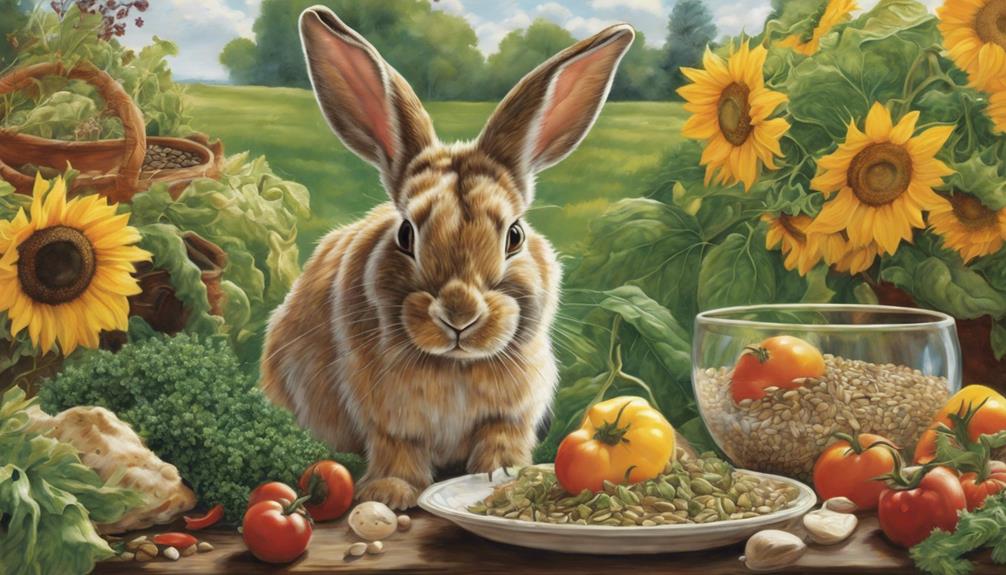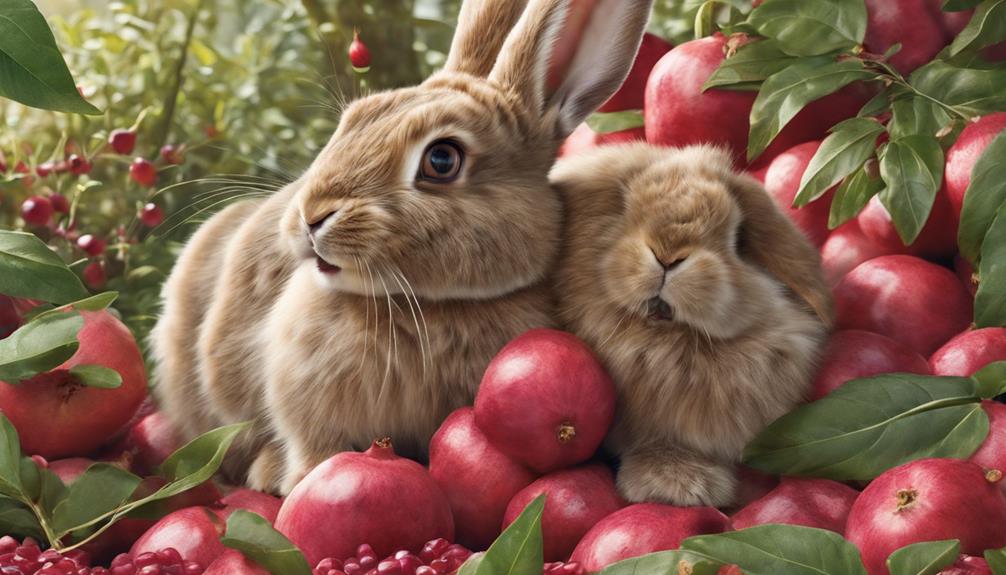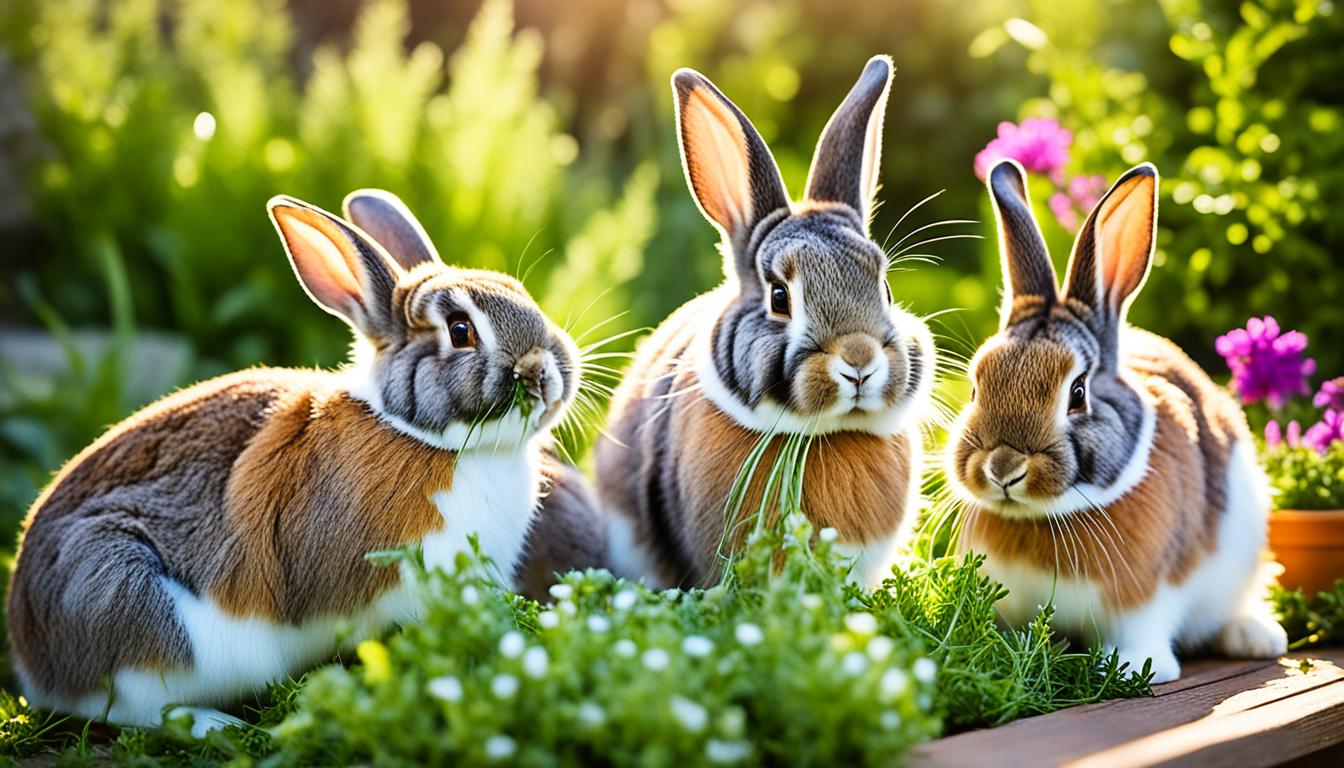When it comes to safely feeding sunflower seeds to rabbits, it is crucial to provide them as a occasional treat to keep a balanced diet. Choose unsalted and additive-free seeds, and make sure to remove hard shells to avoid choking risks. Keeping an eye on your rabbits for any adverse reactions is vital, and keep in mind that moderation is important to avoid problems such as obesity and digestive issues.
If you follow these guidelines, your furry friends can enjoy the benefits of sunflower seeds without compromising their well-being.
Key Takeaways
- Offer sunflower seeds as occasional treats to prevent overconsumption.
- Choose unsalted and additive-free seeds for rabbit safety.
- Monitor rabbits for adverse reactions after introducing sunflower seeds.
- Remove hard shells before feeding to avoid choking hazards.
- Limit sunflower seed intake to 5-10 seeds per week for optimal health.
Nutritional Benefits of Sunflower Seeds for Rabbits
Sunflower seeds offer rabbits a vital source of essential nutrients, including protein, fiber, calcium, vitamins, and minerals, beneficial for their overall health and coat condition. Rabbits require a well-rounded diet to thrive, and incorporating sunflower seeds can contribute positively to their nutritional intake. The protein in these seeds aids in muscle development and repair, while the fiber supports healthy digestion. Additionally, calcium is necessary for strong bones and teeth in rabbits. Vitamins like vitamin B-complex and vitamin E found in sunflower seeds play a significant role in maintaining overall health and immunity.
However, it's important to be mindful of overfeeding sunflower seeds to rabbits. Consistent overconsumption can lead to issues such as triggering a molt prematurely. During molting season, sunflower seeds can be particularly beneficial for rabbits, assisting in maintaining a healthier coat. Opting for larger seeds like Black Oil Sunflower Seeds in limited quantities ensures that rabbits can enjoy the nutritional benefits without any negative effects on their health.
Types of Sunflower Seeds Suitable for Rabbits
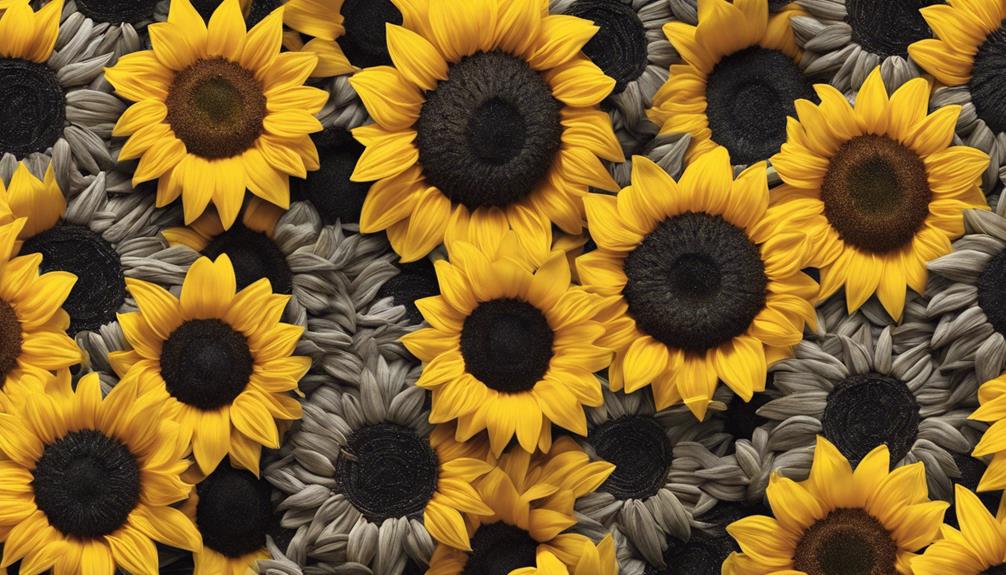
After exploring the nutritional benefits of sunflower seeds for rabbits, it becomes imperative to select the most appropriate type of seeds to optimize their health and well-being. When considering sunflower seeds for your furry friend, Black Oil Sunflower Seeds (BOSS) stand out as the top choice due to their rich nutrient profile. Below is a table highlighting the essential nutrients found in BOSS that contribute to your rabbit's overall health:
| Nutrient | Benefits |
|---|---|
| Protein | Aids in muscle development and repair |
| Fiber | Supports digestion and gut health |
| Healthy Fats | Essential for energy and skin health |
| Calcium | Strengthens bones and teeth |
| Vitamin B complex | Helps with metabolism and energy production |
| Vitamin E | Acts as an antioxidant for overall well-being |
How to Safely Feed Sunflower Seeds to Rabbits
When incorporating sunflower seeds into a rabbit's diet, it's important to follow specific guidelines to guarantee their safety and well-being. Here are some key tips to safely feed sunflower seeds to rabbits:
- Offer as a Treat: Use sunflower seeds as an occasional treat rather than a daily meal to maintain your rabbit's health.
- Check for Additives: Make sure the sunflower seeds are unsalted and free from any additives before feeding them to your rabbit.
- Monitor Reactions: Watch your rabbit closely for any adverse reactions when introducing sunflower seeds into their diet.
- Remove Hard Shells: Always discard the hard shell of the sunflower seeds to prevent choking hazards for your rabbit.
- Moderation is Key: Remember that moderation is important when including sunflower seeds in your rabbit's diet to prevent issues like obesity and digestive problems.
Risks Associated With Sunflower Seeds for Rabbits
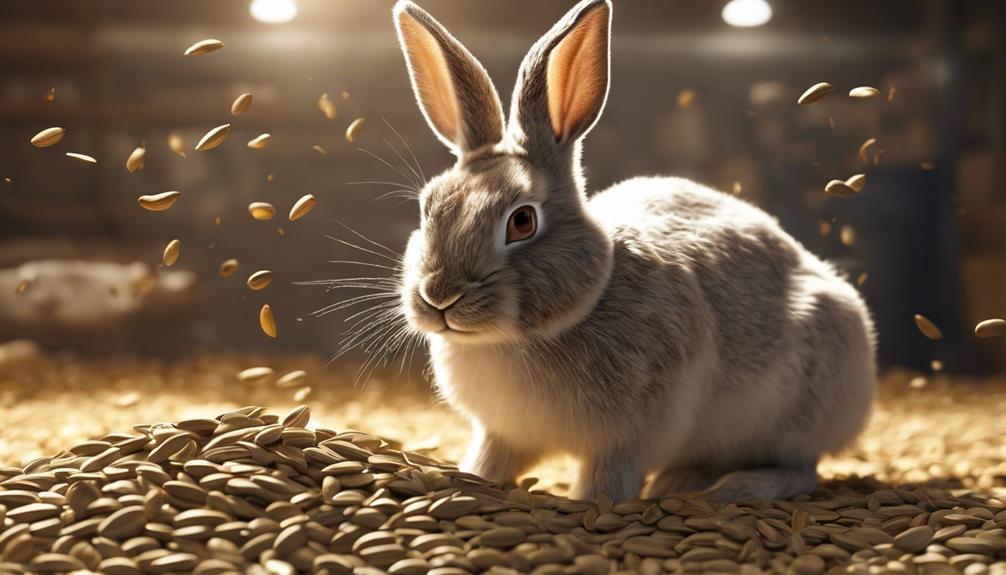
While sunflower seeds can be a tasty treat for rabbits, it's important to be aware of the potential risks associated with incorporating them into their diet.
Sunflower seeds have a high-fat content, which can lead to obesity and digestive issues in rabbits if consumed excessively. Experts recommend moderation, suggesting between 5 and 10 sunflower seeds per week to prevent adverse reactions.
It's essential to avoid offering salted sunflower seeds to rabbits as this can contribute to dehydration. Additionally, shelling the sunflower seeds before feeding them to rabbits is advised for safety reasons.
Best Practices for Offering Sunflower Seeds to Rabbits
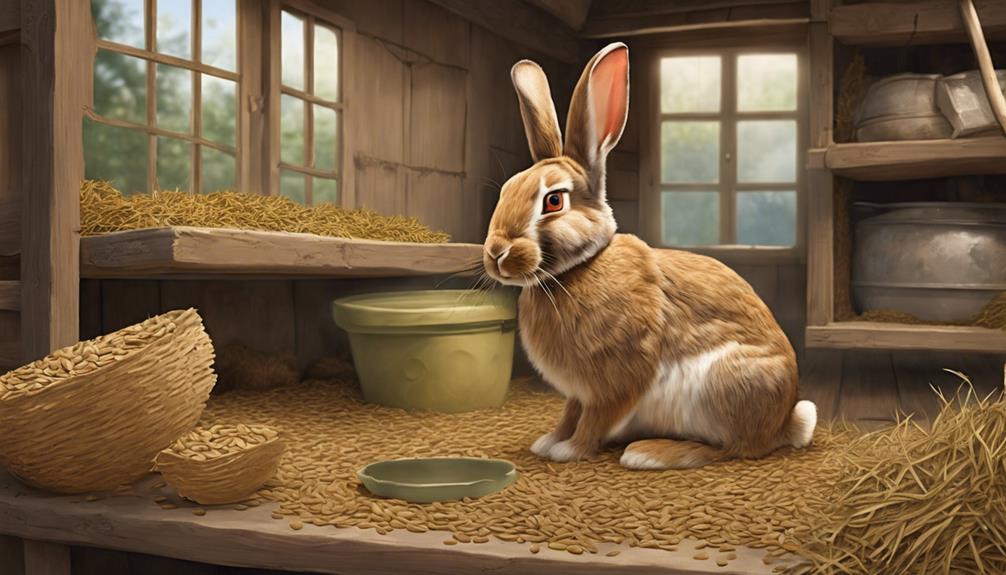
Let's guarantee the well-being of your rabbit by implementing best practices when offering sunflower seeds as treats.
- Monitor Portion Sizes: Limit sunflower seed consumption to 5-10 seeds per week to prevent weight gain.
- Consider Shell Removal: Removing the hard shell of sunflower seeds can prevent choking hazards for rabbits.
- Choose the Right Type: Opt for black oil sunflower seeds, as they're high in fat and provide essential nutrients.
- Supervise for Allergic Reactions: Watch for any signs of allergic reactions or digestive issues when introducing sunflower seeds.
- Use Sparingly: Sunflower seeds should only be used as occasional treats, not as a staple in a rabbit's diet.
Frequently Asked Questions
Are Sunflower Seeds Safe for Bunnies?
Sunflower seeds can be safe for bunnies in moderation. As treats, not a dietary staple. Monitor for adverse reactions. Choose unsalted varieties. Consult a vet for guidance. We prioritize bunny health above all.
What Happens if My Rabbit Eats Seeds?
If our rabbit consumes seeds, potential digestive issues like blockages or discomfort may arise. We should monitor for distress or unusual behavior and seek a vet's help if needed. Moderation in feeding seeds is essential for their health.
What Seeds Are Safe for Rabbits?
Seeds safe for rabbits include black oil sunflower seeds. Moderation is key to prevent health issues. Avoid salted varieties, opt for unsalted. Nutritious options like sunflower seeds without shells can be given, ensuring a balanced diet.
How Often Can Rabbits Have Black Oil Sunflower Seeds?
We love spoiling our bunnies with black oil sunflower seeds, but remember, moderation is crucial! Offering 5-10 seeds weekly guarantees they receive essential nutrients without overindulging. Let's keep those fluffy friends happy and healthy!
Are Sunflower Seeds and Olives Safe for Rabbits to Eat?
Yes, rabbits can safely eat sunflower seeds and olives as an occasional treat. However, too much of this snack can upset their stomachs due to the high fat content. Offer them in small amounts as a special snack for your furry friend.
Conclusion
To sum up, sunflower seeds can be a great addition to a rabbit's diet when fed in moderation and with caution.
By choosing the right type of seeds, introducing them slowly, and monitoring for any negative reactions, rabbits can enjoy the nutritional benefits without facing any risks.
Remember, the key is always to prioritize your furry friend's health and well-being above all else.
So go ahead, treat your rabbit to some sunflower seeds, but remember to do so with care.
